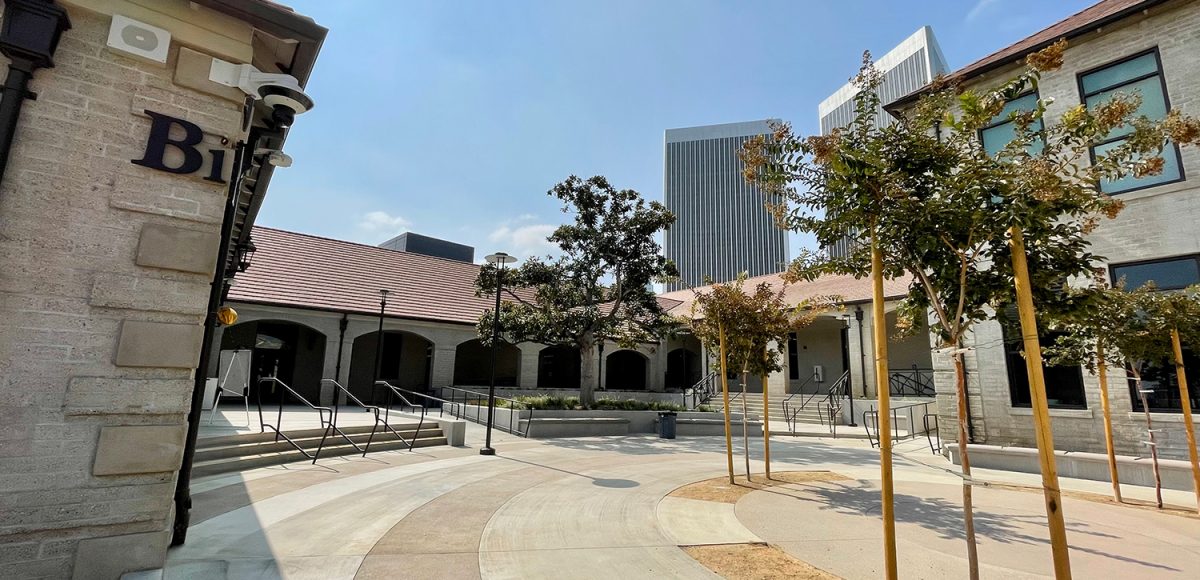The Beverly Hills Unified School District (BHUSD) Board of Education has put out a request looking for a new manager of the district’s bond program in a 4-1 vote. The move marks the latest chapter in a saga that has seen the public and members of the board sour on the program’s current manager, Team Concept Development Services (TCDS), run by owner Don Blake.
“At best, I have found our current process, systems and information we are receiving regarding the state of our construction program to be opaque,” Board member Gabriel Halimi, who was absent for the meeting but explained his vote in a detailed letter, wrote. “Just over the last few months, we’ve found ourselves surprised, confused and frustrated. And given the fact that we’re over budget and delayed in delivery, there are questions that need clear answers.”
In 2008, Beverly Hills voters passed Measure E, allowing BHUSD to issue $334 million in bonds. Another bond measure, Measure BH, passed in 2018, authorizing the district to issue another $385 million in bonds. Together, the bonds provide funding for modernization, seismic retrofits, new buildings, and improved security.
But since 2008 and 2018, many of the improvements promised by Measures E and BH have failed to materialize on time or on budget, with certain projects scrapped from the plans altogether. In an October study session, Blake reported to the board that the program was short by $129 million, though TCDS recently put out a revised figure of $89 million.
The delays and cost overruns have led to frustration among Beverly Hills taxpayers, especially those whose children attend BHUSD schools.
“During the entire elementary tenure of my children, they lacked clean bathrooms, adequate classrooms, a presentable cafeteria, and they didn’t benefit from the safe playgrounds or even an auditorium to graduate in,” said one parent, Daphna Hollander, in a public comment. “We put our trust in these board members and others, and unfortunately, we feel let down and lied to. My daughter is now in high school.”
Frustration among trustees has also grown since TCDS came on board in 2017, with members complaining about a lack of transparency on the part of Blake and TCDS.
“From the time that I’ve been on this board, and prior to that, sitting on the [Citizens’ Bond Oversight Committee], I do believe that we have an issue with transparency and accountability when it comes to our bond construction program,” said Board President Mary Wells.
Over the course of TCDS’s tenure, Wells said that it has been “very difficult” to receive information from the bond manager “so that I can have the sufficient amount of information that I need as a board member to make an informed decision.”
Trustee Rachelle Marcus expressed concerns over TCDS’s monthly payroll costs, which she said, “amounted to $268,000 for the month of February.” At that level, the firm would bill the district more than $3.2 million for a year of work.
“I find that amount unbelievable,” Marcus said.
Marcus and others also raised concerns about the process through which TCDS received its contract with the district, saying that the five-year contract had not gone through the typical request process.
“Five years ago,” Marcus said, “there was no [Request for Proposals (RFP)] at that time. The agreement was negotiated with no competing bids.”
Board Vice President Noah Margo pushed back on this, saying that a request had been made in 2016. However, Margo acknowledged in follow-up questions from the Courier that TCDS had not submitted a proposal in 2016. Furthermore, the request put out in 2016 was for construction management services, not bond management services, which TCDS provides.
The school board already voted on Feb. 1 to put out a request for a new bond manager, with the TCDS contract due to expire on July 17. The vote on March 22 approved the language and specifics of that request. Both votes split along the same lines, with Margo casting the lone dissenting votes.
The request gives interested parties until May 23 to submit a proposal. It calls for submissions from firms with “extensive experience in construction of public-school facilities in California,” along with other relevant qualifications. It does not state when the board will make a final selection.
While TCDS is not barred from submitting a proposal of its own, Blake must first renew his contractor’s license to quality.
Halimi called for a restructuring of the relationship between the board and the bond manager, whoever that may end up being. As currently structured, the bond manager reports directly to the Board of Trustees, which is charged with interpreting the reports and holding the bond manager accountable. But Halimi, addressing his colleagues in the letter, acknowledged his own limitations in performing that task.
“I, like all of you, am a part time volunteer and not a professional, full time board member. The onus is not and should not be on us as board members to be experts in construction management, forensic accounting, our property inspection and know exactly what reports to request and data to see and then chase the information we’re not getting,” he wrote.
The reports should instead pass through intermediaries with the right backgrounds and expertise to interpret and explain the data to both the board and the public, he said.
Margo, the only current trustee on the board when Blake took over as bond manager in 2017, made an impassioned defense of the bond program and Blake at odds with the rest of the board. Margo described the program as “unparalleled and recognized by every governing state agency involved in our projects.”
“They are a World Series Super Bowl championship team that we are on the verge of getting rid of,” he said.
An audit of the district’s bond management program covering fiscal year 2019-2020 praised BHUSD and TCDS as consisting “of highly experienced development professionals with a strong track record of successful completed projects.”
Margo said that architects, constructions firms, and contractors working on the construction projects have all applauded “the success of the program.” Even members of the board had extended kind words to Blake as recently as December, with then-President Rachelle Marcus saying she “continued to be amazed at the complications and the unbelievable amount of work and the fact that it’s proceeding is amazing.”
“The decision that is about to be made by this governing body is perhaps the most dangerous and impactful decision I’ve ever been a part of,” Margo said, a mistake he attributed to a changing “narrative combined with a lack of understanding.”
Many of the arguments put forward by Margo were echoed by a Change.org petition circulating just before the vote. Though it only attracted a few dozen signatures, the petition, authored by Deena Wachtel, characterized the vote as “bear[ing] the hallmarks of a false flag initiative” and landed in the inbox of each member of the Board of Trustees. It was shared on social media by Laura Margo, the wife of Noah Margo and a commissioner on the Human Relations Commission.
“Have you decided they are just too expensive?” the petition asks. “Have you made any effort to discuss your concerns with TCDS? Going through an RFP and award process will definitively drive up costs and possibly durations for the construction efforts, so presumably cost is not your primary concern.”
Former board Vice President Tristen Walker-Shuman, who signed the petition, compared the cost overruns to gas prices.
“Let’s say you owned a business that relies heavily on driving and you allow for $4.50 per gallon for gas and all the sudden the price per gallon goes up to $6,” Walker-Shuman wrote. “Does that mean that you have planned poorly and are over budget? No, it means the price of the commodity has changed so you need to make adjustments like passing the price onto the consumer.”
Walker-Shuman also pointed out to the recent competition of the Beverly Hills High School buildings B1 and B2, which came in on time and under budget as proof of the success of TCDS.
“Trying to say that this means you’re over budget or have poorly planned or mismanaged is absolute gaslighting,” wrote Walker-Shuman, who resigned from the board in September following allegations that she misrepresented her residency status. “This push to replace TCDS and put out for an RFP is nothing more than propaganda.”
In his letter, Halimi acknowledged some of the unforeseen challenges faced by TCDS in executing the bond measures, namely “previously unknown oil well issues, COVID-19, inflation escalations, and the fact that we’re in the worst supply chain crisis of our lifetime.”
But Halimi, like other board members, could not accept these explanations at face value without clear data to back them up.
“In theory, we could have the best managed bond and construction program in the country, but [with] the data I have today, I haven’t been able to come to any conclusions,” he said. “But now, with the imminent expiration of the five-year TCDS contract, we have the opportunity to course correct and I believe we must take it.”







